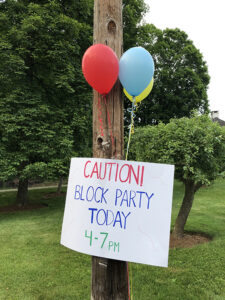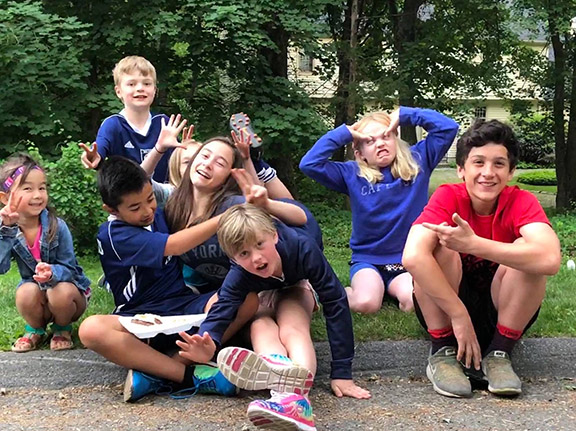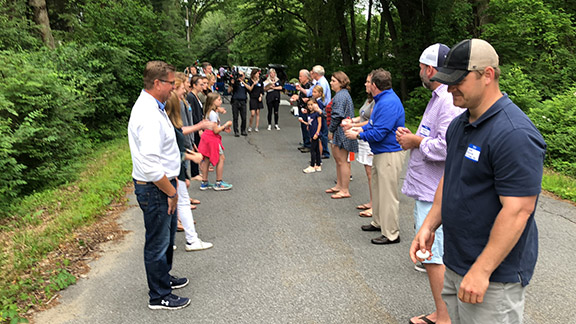In the summer of 1979 in St. Louis, Missouri, on a road that dead-ended at a working farm, Vanessa Elias attended an event so engaging, so magical, that the experience has been forever etched in her memory. Picture a Saturday Evening Post cover in the style of Norman Rockwell, come to life: folding lawn chairs, hamburgers sizzling on the barbecue, and the distinctive clang of metal against metal as adults casually toss horseshoes, all punctuated by the unbridled laughter of neighborhood kids as fireflies light up the evening sky.
 “That block party was so much fun,” recalls Elias nostalgically. “There were no cliques or age barriers. The kids were running wild through the backyards and had free range of the entire street. We took dips in a galvanized metal stock tank, played tag in the dark, and enjoyed seeing our parents hanging out and having a good time.”
“That block party was so much fun,” recalls Elias nostalgically. “There were no cliques or age barriers. The kids were running wild through the backyards and had free range of the entire street. We took dips in a galvanized metal stock tank, played tag in the dark, and enjoyed seeing our parents hanging out and having a good time.”
While that experience became a defining moment for Elias, another memorable event occurred much later that also had a lasting impact. In 2007, Vanessa and her husband Eugene, relocated to Surrey, England with their young daughters Chloe and Mia. Having made multiple moves both nationally and internationally, Elias was a seasoned pro at upping stakes and resettling someplace new. While filling out school paperwork, she was suddenly stymied by a routine question. “The form asked for an emergency contact and I didn’t have anyone to put down,” she says. After an awkward moment, the school registrar offered to become the official contact for the family. “At that moment, I was feeling bereft and overwhelmed and that woman’s gesture of kindness really stayed with me.”
Having moved a staggering 28 times in her life, Elias knows firsthand how important it is to make a genuine connection with people in your community. Ten years ago, Vanessa, Eugene and their three children settled in Wilton, CT. Elias, a mental health advocate, is a parent support group facilitator for the National Alliance on Mental Illness (NAMI), the past president of the Wilton Youth Council, and a key player in starting the Free Play Task Force in Wilton. These experiences have given her a clear, unvarnished view of the mental health challenges faced by today’s children, teens, and families.
Elias is convinced a crippling loneliness epidemic exists in this country, one that has been exponentially magnified by the Covid years. “There’s a serious mental health crisis. Technology is not a replacement for in-person connection. We are disconnected from each other in a very real way.”
 An empathetic and positive person, Elias has now dedicated her talents to finding workable solutions to help everyone feel less lonely and more engaged with one another. Her efforts also include seniors, couples without children, and single adults, who often feel excluded from family-oriented activities. Elias believes community connection can organically evolve in a fun, low-tech way, simply by neighbors gathering together for a block party.
An empathetic and positive person, Elias has now dedicated her talents to finding workable solutions to help everyone feel less lonely and more engaged with one another. Her efforts also include seniors, couples without children, and single adults, who often feel excluded from family-oriented activities. Elias believes community connection can organically evolve in a fun, low-tech way, simply by neighbors gathering together for a block party.
Simplicity is key: select a date, decide on a location (the more informal, the better), check with your local municipality to see if you need a permit, drop off flyers at neighbor’s homes, and figure out unfussy refreshments.
“Block parties should not be elaborate, costly, or staged for social media consumption,” emphasizes Elias. “These gatherings are about putting away phones, meeting and enjoying neighbors, and fostering more free play for children.”
For the past several years, in June and September, informal block parties have sprouted up all over Wilton. News of these gatherings spread to neighboring towns and now Ridgefield, New Canaan, Westport, and many communities beyond, are hosting their own block parties.
Inspired by the success of such a simple concept, Elias recently launched Block Party USA (blockpartyusa.org), a non-profit organization committed to encouraging towns and cities around the country to embrace the idea of community connection through hosting block parties. The website provides easy-to-follow directions and encourages people to initiate their own traditions — start an ice cream social, a pot-luck barbecue, game day, or a pizza party. Make sure to include everyone, and help teens to feel needed by giving them a purpose — encourage them to design a flyer, come up with a game for the little kids, or carry coolers to a designated spot.
 The benefits of block parties are tangible. People soon realize they have more in common than they thought, kids make new friends, teens may be hired by neighbors for babysitting, snow shoveling, or dog walking, and everyone benefits from greater social connectedness.
The benefits of block parties are tangible. People soon realize they have more in common than they thought, kids make new friends, teens may be hired by neighbors for babysitting, snow shoveling, or dog walking, and everyone benefits from greater social connectedness.
“Play is important for us all,” says Elias. “There’s something special about participating in an endeavor on a small scale that connects everyone on a larger scale. It just takes one person to be a catalyst.” •